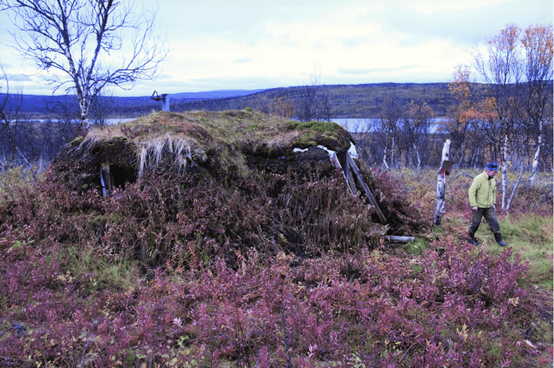Written by Olga Ievleva and Roni Kantola
The Arctic region occupies a huge territory. Due to climate change, this land is experiencing rapid and comprehensive changes, which require constant monitoring and analysis. However, the process of gathering the data on occurring development is hampered by the remoteness of the Arctic and lack of logistic opportunities as well as the limitation of funding.
Although the Arctic is not densely populated there are people who live even in the most remote parts of the region. These people have practical experience of life in the region and observation of occurring changes impacting their life. Consequently, the local population can provide some essential research data that can be used by science, policymakers, and people themselves.

So what is local knowledge?
The most popular adjectives accompanying knowledge in this context that can be found in various papers are local, traditional, and indigenous. We prefer to use the term local knowledge as it is the widest term that can include both traditional and indigenous knowledge.
Local knowledge can be defined as knowledge accumulated by people living in a certain area for a long time. In the context of the Arctic region, indigenous or traditional knowledge takes an essential part within this concept, as they present an invaluable set of data about life in the Arctic which is passed from one generation to another, and which finds its expression in objects of everyday life.
What are the pros and cons of local knowledge?
Local knowledge has certain drawbacks such as inaccuracy, the generality of the information, and often subjectivity. However, some advantages make local knowledge so valuable for scientists. We have already mentioned that it is not always possible to cover a wide area of the Arctic and as a result, some essential changes occurring in the area can be left without attention. In this case, the local population can be a primary source of information. It also presents an opportunity to observe occurring events in a socio-economic context. Scientists can gain not just naked facts about changes happening in nature, but also how those events impact the life of the locals.
What does the incorporation of local knowledge mean for knowledge production in general?
The data need to be interconnected. This is partially technical. For interlinking and interoperability, the infrastructures should be uniform, e.g. there should be standardized vocabularies. The databases should be accessible, open, and part of the machine-readable semantic web. With complexity, we need auxiliary tools. However, cultural changes are required. Some additional—even seemingly irrelevant—data need to be produced and linked right away in situ. Automation can help, but there should be decisions to use compatible methods.
We need multiple flexible knowledge management tools. Local knowledge in particular comes in many forms. For example, some knowledge-producing platform can be a game, another can be strictly economic. Knowledge can be ever-changing, relational, and subjective, so it is not just static objective facts. The amount of data increases exponentially when every locality and aspect gets mapped in.
The data and the tools need to be co-managed. They cannot simply be distinct research projects or top-down controlled national platforms. It is about rights too. Sometimes providing knowledge about external causes has harmed the local communities. Some sensitive content can be restricted from direct public use.
What shapes can local knowledge take?
Spatial information is a great example of data that is linked. It is now produced in high amounts, relatively easy to link to some data, and almost always relevant for ecological and cultural research. However, the other data needs to be well-structured too, so that it could be readily analyzed.
Local knowledge might be e.g., narrational and emerging only in some situations. Assessing it demands robust qualitative research approaches. But more relaxed and lengthy processes can help too. Some of the knowledge can be transformed into more quantitative forms. However, the remaining bits can be linked too. There is already a great body of data out there, for example, in hundred-year-old ethnographic books, describing local worlds.
Why do we need to act now?
Lots of knowledge is hidden and we might lose that knowledge. It is of utmost importance to try to find what might be disappearing. Environmental and cultural change can go hand in hand.
Assessing and linking environmental and cultural features and especially changes can help in predicting and highlighting things that might go unnoticed. This can enable adaptations. Systematic and platform-aided approaches could revitalize networks of local knowledge, preserve heritage, and benefit the continuity of the cultures and the natural environment in economic ways too.
How does local knowledge work in practice?
There are few cases of extensive incorporation of local knowledge into science as described previously, but there are many partial cases. One common method is kitchen table mapping, for example with Smith et al., the local fish harvesters marked fishing spots on a large map and provided a great amount of detailed information and new place names. Multimedia and geographic information systems (GIS) used as memory banks can act as aids for safeguarding and passing local knowledge inter-generationally and dispersed community members. The generated maps can include things such as 6000-year-old turf huts, turf huts that are still in use, traditional sedge harvesting sites, and snowier and thus mosquito-free resting areas for reindeer. These data could be combined with projected land cover change data. Crowdsourcing data can be inexpensive, yet extensive, which is why public participation GIS has been used by national institutions to assess things like species observations.

Conclusions
In conclusion, local knowledge represents a valuable instrument for gathering data. In particular, the Arctic region poses certain difficulties for scientists in conducting research due to its harsh climate conditions and remoteness. Local knowledge provides a chance to receive data even from the most remote places, as well as, to observe processes in the context and make inferences on the impact of certain events on human beings in the Arctic.
Local knowledge can be included in the general system of knowledge production, although it still requires systematization and generalization to make the process of gathering local knowledge unified and common.
Olga Ievleva, Bachelor in International Relations, studies at Saint Petersburg State University Master Programme “International relations in English”, makes an exchange semester at the University of Helsinki.
Roni Kantola, Bachelor of Science in Environmental Ecology, studies at the University of Helsinki’s Master’s Programme in Environmental Change and Global Sustainability.
Barlindhaug, S. 2012: Mapping Complexity. Archaeological Sites and Historic Land Use Extent in a Sámi Community in Arctic Norway. — Fennoscandia Archaeologica XXIX: 105–124.
Barlindhaug, S. & Corbett, J. 2014: Living a Long Way from Home: Communicating Land-related Knowledge in Dispersed Indigenous Communities, an Alternative Approach. — Acta Borealia 31(1): 1–24.
Pettersen, B. E. 2011: Mind the digital gap: Questions and possible solutions for design of databases and information systems for Sami traditional knowledge. — In: Porsanger, J. & Guttorm, G. (eds.), Working with Traditional Knowledge: Communities, Institutions, Information Systems, Law and Ethics: 163–193. Dieđut 1/2011. ISBN: 978-82-7367-028-1.
Smith, D., Woodrow, M. & Vodden, K. 2015: A boat perspective: local geographic knowledge of fish harvesters in Change Islands, Newfoundland. — Journal of Cultural Geography 33(1): 1–26.
